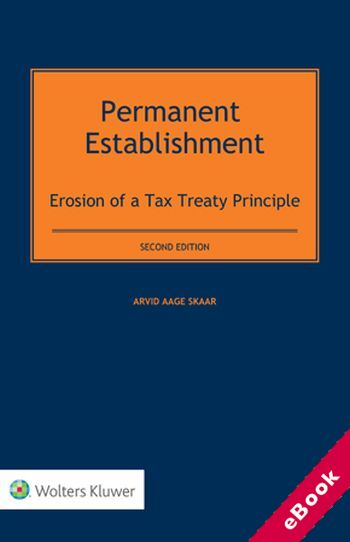
The device(s) you use to access the eBook content must be authorized with an Adobe ID before you download the product otherwise it will fail to register correctly.
For further information see https://www.wildy.com/ebook-formats
Once the order is confirmed an automated e-mail will be sent to you to allow you to download the eBook.
All eBooks are supplied firm sale and cannot be returned. If you believe there is a fault with your eBook then contact us on ebooks@wildy.com and we will help in resolving the issue. This does not affect your statutory rights.
Permanent Establishment is the second edition of a book that was originally published in 1991. The aim is to bring the book up to date with the current internationally accepted interpretation of permanent establishment (PE). This edition of the preeminent work on PE is a major event in tax law scholarship. Taking into account changes in judicial and administrative practice as well as the Organisation for Economic Co-operation and Development’s (OECD’s) and the United Nation’s (UN’s) work in the three decades since the first edition, the present study has added a lot to the understanding of the concept of PE since then. The analysis is based on more than 720 cases from 20+ countries, in addition to the OECD and UN model treaties and approximately 630 books, articles, and official documents.
What’s in this book:
The increased significance of the digital economy has rendered the traditional concept of PE inadequate for the allocation of taxing jurisdiction over the modern, mobile or digital international business. The author’s in-depth analysis explains the legal elements of the PE principle with attention to their continuing benefit and their shortcomings:
The book provides many synopses of court decisions and administrative rulings upon which the analysis is based. In addition to cases previously published in law reports and other publications, a number of unpublished decisions are included. A keyword index makes it easy to find what is needed in any particular matter.
How this will help you:
The PE principle, in one version or another, is used in several thousand tax treaties in force today. This updated comprehensive study reveals the obligations imposed through the use of PE in tax treaties and will continue to be of immeasurable value to tax practitioners and scholars worldwide. In addition, the discussion of whether the notion of PE is an appropriate criterion for taxing jurisdiction in international fiscal law today provides authoritative and insightful food for thought. The authoritative analysis including many references to major case law and commentaries will help the reader to support an argument in tax disputes.